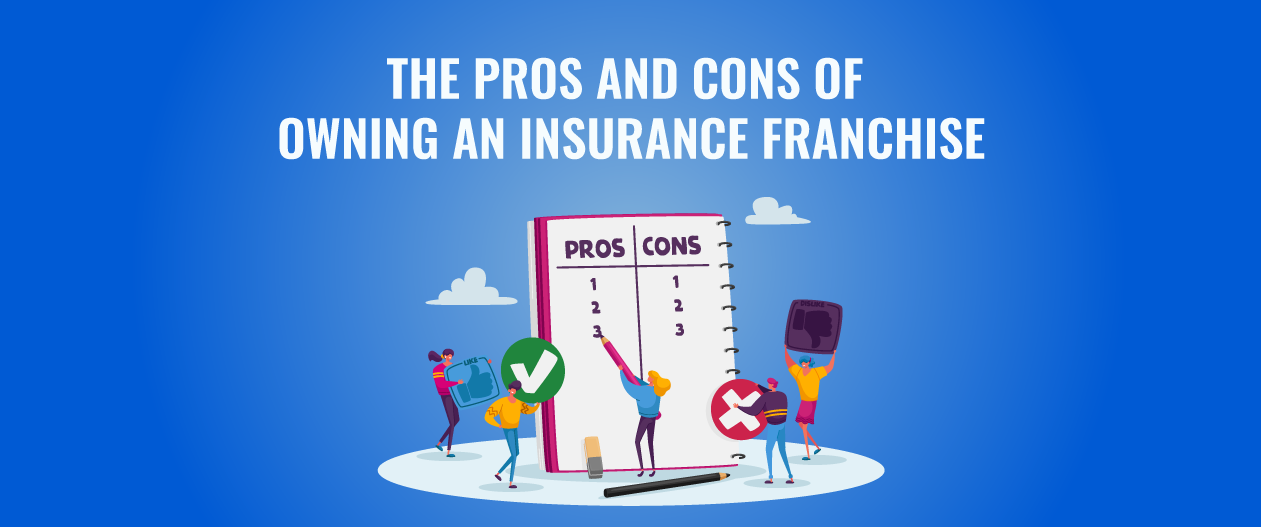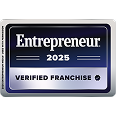Ownership of a franchise insurance company can offer entrepreneurs a rewarding career experience, both monetarily and emotionally. But it’s not for everyone — nor should it be.
Is this business model right for you? Should you at least take a closer look? Before deciding, review a few good reasons to become a franchisee — and a few not to.
Key takeaways
Benefits of Owning an Insurance Franchise:
- Established brand recognition that creates instant customer familiarity
- Access to a pre-existing business model and ongoing support from experienced professionals
- Assistance with licensing and compliance in the highly regulated insurance industry
- Access to a wide range of insurance products and providers beyond what a single company offers
- Marketing and lead generation assistance, leveraging the franchisor’s existing customer base
Drawbacks of Owning an Insurance Franchise:
- Financial obligations including initial investment costs and ongoing franchise fees
- Limited business autonomy, as you must follow the franchisor’s established standards
- Potential market saturation issues if too many franchises exist in your area
- Dependence on the franchisor’s reputation, meaning their mistakes can affect your business
- Territory limitations may affect brand recognition if you’re the first franchise in a region
Benefits of Owning an Insurance Franchise
Here are five leading reasons to at least consider such an economic opportunity.
Established Brand Recognition
You’re starting a new company — but not starting from scratch. With most startups, you have to begin by introducing yourself, your company, and your mission. No one knows who you are or what you do. Your company name and logo are unfamiliar to prospective customers, so why should they take a chance with you when there are more familiar names right down the street?
That’s not what happens when you carry a familiar name, logo, and business model. That’s one key advantage of taking on the identity of a known and successful franchisor: instant brand recognition. Your customers feel like old friends even before they walk in the door or shake your hand for the first time.
Pre-Existing Business Model and Support
What do you know about starting and operating your own business? Probably very little, especially if you’re a first-time business owner. It’s all trial and error. You try something, and if it works, you keep doing it. If it doesn’t — well, it’s just an expensive failure that’s taught you what not to do.
The advantage of becoming a franchisee of a successful organization is that the larger company has already found success and has been on the right path for years. Decades, even.
No, they weren’t perfect. They probably made plenty of errors and lost money — at first. But they learned by their mistakes long before they adopted the business franchising model.
If you select the right franchisor, you can take advantage of all of that company’s achievements and avoid the errors they’ve already made and will steer you clear of. The kind of insurance franchise you want to follow is one that will provide the support you need when you need it, and base it on their rich experience as successful business owners.
Easier Licensing and Compliance
This is another area in which a good franchisor has your back. You’re not in it alone, feverishly researching the web to find licensing and legal requirements before you hang your sign on the window.
Having an experienced insurer on your team is critical since the insurance industry tends to be highly regulated. The licensing, legal, and regulatory requirements vary by state, and your company can be in a lot of trouble if you get it wrong.
A good insurance franchisor will be able to help you get certification where you’re doing business and guide you through legal requirements whenever you need assistance.
Access to a Wide Range of Insurance Products and Providers
If you work as an agent employee for one company, that company’s inventory of insurance products is what you have to sell. If your company doesn’t carry the product your customer needs, or it’s not at a competitive price, you’re out of luck. Your customer goes elsewhere.
However, if you connect with an insurance franchise that has contractual relationships with numerous major brands and product lines, that’s what you have to sell. As an independent agent, you have access to a range of products at various quality and cost levels and can find the uniquely best option for every customer. No more watching folks walk away because you have nothing to sell them.
Marketing and Lead Generation Assistance
Imagine starting your company with zero recognition and not a single customer. Maybe an old friend or a family member buys from you as a favor. But then what? You know you need to advertise and promote your business, but you haven’t the slightest idea how to proceed. Or what it will cost. Or how you’ll get the money.
Good luck with that.
As a franchisee of a successful business, you’ll have the advantages of sophisticated marketing campaigns and have access to customers who are already familiar with your name. They might have bought your products. They already know and respect you because they’ve done business with, or are at least familiar with, another business with the same name, branding, and ways of doing business.
That head start is especially critical in the early days of your startup — before you’ve had time to build a clientele based on your own merits. You basically inherit the merits — and the customer base — of the franchisor and other successful franchisees.
The Cons of Owning an Insurance Franchise
As was mentioned, owning and operating an insurance franchise isn’t for everyone. Here are four reasons that might make you ignore the opportunity.
You’ll Pay an Initial Investment and Franchise Fees
Of course, there are startup costs. No matter what kind of business you own and operate, you’ll have those upfront costs of some kind. But in addition, when you own a franchise you must pay franchise fees. That’s how your franchisor makes money.
One advantage of opening an insurance agency is that you can contain your startup costs. Your first “office” might be your kitchen table, you might be your sole employee initially, and you’ll need not much more in the way of gear, equipment, and inventory than a laptop, phone, business cards, and a website.
The franchise fee is your royalty cost for selling the products or services that are owned by the franchisor. After all, it’s the success of those goods that have drawn your interest in that company in the first place.
You can draw up your franchise fees in a number of ways. For some franchise operations, it’s an after-sale percentage of your gross sales or profits. Or it might be an upfront cost based on an expectation of sales. You might also have to share in the cost of the advertising that delivers customers to your front door.
However your franchise fees and other cost details are determined, you’ll see it in writing in your franchise agreement. Let your accountant, lawyer, or other advisors review this document before you sign anything. Make sure that the financial arrangement and other details are fair, realistic, understandable, and achievable.
Limited Business Autonomy.
You own the business. You’re the boss.
However, there are certain standards and ways of doing business that you must observe. After all, it’s conformity that your customers want and expect. Many are doing business with you for the first time because they recognize and have patronized the same brand and products at another location. Or they’ve seen a TV commercial for your company. Or they have a friend or family member who’s done business with a franchise company that looks and operates just like yours.
Imagine if you were a McDonald’s restaurant franchisee who decided to ditch the Big Mac and instead sell meatloaf, potatoes, and gravy. You might have a terrific meatloaf recipe, but that’s not what your customers come for or expect. They want a Big Macs and fries.
If you want to take advantage of a tried and true business model with high brand recognition and acceptance, consider buying a franchise. But if you want to create something entirely new, you might be better off taking another direction.
Dependence on the Franchisor’s Reputation
You just read about the advantages of your franchisor’s brand recognition and acceptance. It’s true. You inherit the good reputation of the company whose name you share, and all the other franchisees.
But what if that reputation’s not so good? If an agent at a company store or another franchise has been found to have cheated or misled policyholders, your business might suffer even though you had nothing to do with the sketchy activity. Same name. Same business.
That illustrates the importance of going with a highly reputable franchisor. Because when you buy a franchise you get credit for all of that company’s good moves — and blame for the bad. Do your research. Make sure customers respect the operations of the company you’re considering so that your franchisor’s reputation is a benefit — not a strike against you.
Market Saturation and Territory Limitation
Is there an XYZ Insurance Agency on every corner? That might be a distinct advantage for policyholders since you’ll all be competing against each other, and premiums will be low. However, it’s a disadvantage if you’re considering becoming an XYZ franchisee.
Market saturation will usually work against you. While on the one hand, all the XYZ logos and signage will build brand recognition, the only way you can stay in business is with fierce price competition against your fellow franchisees. That’s not good.
Territory limitations can work against you in a different way. If you live in a city, state, or even region of the country where there are no franchisees, you might have the market to yourself. But if the franchisor isn’t eager to get into your market at that time, you might be left out in the cold.
Territory limitations can also trip you up with weak brand recognition. If you’re the first franchise in that part of the country, maybe your prospective customers have never heard of the XYZ Insurance Agency. Therefore, you lose all the brand benefits of being part of a well-known and successful enterprise.
The answer here is to ask yourself whether you’ve ever heard of the insurance franchise operation you’re considering. If there are others in your marketing area, plot them out on a map. Avoid doing business with a franchisor who saturates the market, or you’ll all be hungering for the same customer base.
Now Consider a Freeway Insurance Franchise
At Freeway Insurance, we’ve welcomed hundreds of franchisees all over the country. Chances are, you live in a franchise-ready market.
As one of the country’s largest and most respected personal lines insurance companies, we offer our franchise-owning agents a powerful inventory of name-brand insurance products in life, auto, home, and business coverage, among other lines. The diversity of your product lines gives you a strong competitive advantage.
You’ll also gain top-tier training, including help getting certified in your state. Once you open for business, you’ll always have Freeway support and guidance when you need it.
But don’t make a hasty decision. Talk with one of our franchise representatives. Ask plenty of questions and crunch the numbers for yourself.
Call us at (877) 822-3024 or contact us to put your insurance career on the fast track.


